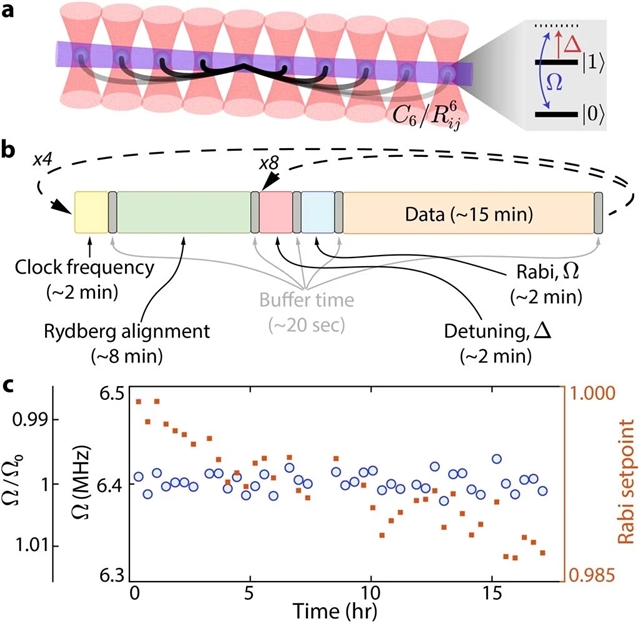
用多体量子混沌制备随机态和基准测试,这一成果由美国加州理工学院Manuel Endres和麻省理工学院Soonwon Choi研究组经过不懈努力而取得。相关论文发表在2023年1月18日出版的《自然》杂志上。
该团队通过预测和实验观察随机状态系综在时间无关的哈密顿动力学下的自然出现来解决这个问题,该团队用它来实现一个有效的、广泛适用的基准测试协议。观察到的随机系综来自投影测量,并密切相关于更大量子系统内子系统之间建立的普遍关联,为量子热化提供了新的见解。
基于这一发现,研究组开发了一种保真度估计方案,研究组用少于104个实验样本演示了多达25个原子的Rydberg量子模拟器。该方法具有广泛的适用性,如该研究团队所演示的哈密顿参数估计,目标状态生成基准测试,以及模拟和数字量子器件的比较。他们的工作对理解量子动力学中的随机性有影响,并使这一概念应用于更广泛的环境。
据悉,在现代量子科学中,随机产生量子态变得越来越重要,在理论和实践上都有应用。特别是,这种随机分布但纯粹的量子态的系综奠定了他们对量子电路和黑洞复杂性的理解,并已被用于量子优势测试中的量子设备基准测试。然而,创建随机系综需要高度的时空控制,这使得这类研究无法对广泛的量子系统进行。
附:英文原文
Title: Preparing random states and benchmarking with many-body quantum chaos
Author: Choi, Joonhee, Shaw, Adam L., Madjarov, Ivaylo S., Xie, Xin, Finkelstein, Ran, Covey, Jacob P., Cotler, Jordan S., Mark, Daniel K., Huang, Hsin-Yuan, Kale, Anant, Pichler, Hannes, Brando, Fernando G. S. L., Choi, Soonwon, Endres, Manuel
Issue&Volume: 2023-01-18
Abstract: Producing quantum states at random has become increasingly important in modern quantum science, with applications being both theoretical and practical. In particular, ensembles of such randomly distributed, but pure, quantum states underlie our understanding of complexity in quantum circuits1 and black holes2, and have been used for benchmarking quantum devices3,4 in tests of quantum advantage5,6. However, creating random ensembles has necessitated a high degree of spatio-temporal control7,8,9,10,11,12 placing such studies out of reach for a wide class of quantum systems. Here we solve this problem by predicting and experimentally observing the emergence of random state ensembles naturally under time-independent Hamiltonian dynamics, which we use to implement an efficient, widely applicable benchmarking protocol. The observed random ensembles emerge from projective measurements and are intimately linked to universal correlations built up between subsystems of a larger quantum system, offering new insights into quantum thermalization13. Predicated on this discovery, we develop a fidelity estimation scheme, which we demonstrate for a Rydberg quantum simulator with up to 25 atoms using fewer than 104 experimental samples. This method has broad applicability, as we demonstrate for Hamiltonian parameter estimation, target-state generation benchmarking, and comparison of analogue and digital quantum devices. Our work has implications for understanding randomness in quantum dynamics14 and enables applications of this concept in a much wider context4,5,9,10,15,16,17,18,19,20.
DOI: 10.1038/s41586-022-05442-1
Source: https://www.nature.com/articles/s41586-022-05442-1
Nature:《自然》,创刊于1869年。隶属于施普林格·自然出版集团,最新IF:69.504
官方网址:http://www.nature.com/
投稿链接:http://www.nature.com/authors/submit_manuscript.html
